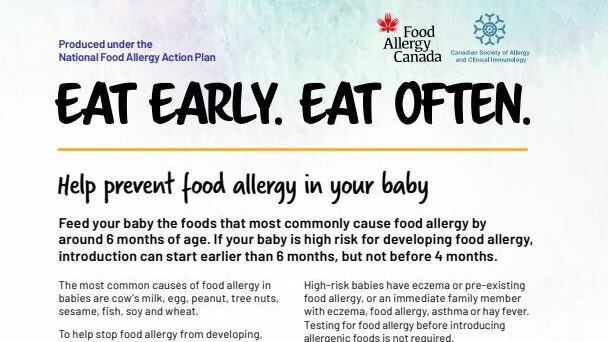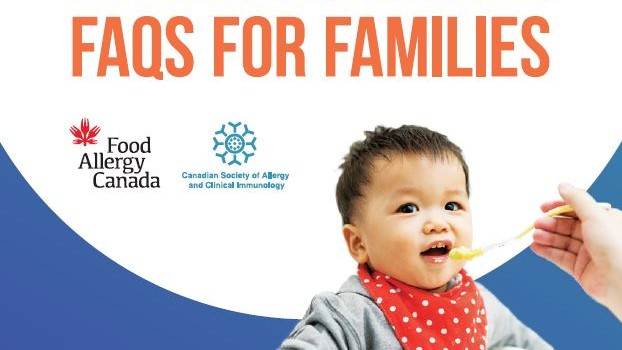Helping to prevent the development of food allergy in infants
Recommendations for the introduction of common allergens to infants have changed as research has emerged on ways to help prevent the development of food allergy in babies.
A 2021 position statement co-published by the Canadian Paediatric Society (CPS) and the Canadian Society of Allergy and Clinical Immunology (CSACI) includes recommendations on the specific timing of early introduction of allergenic foods for high-risk infants.
The current guidance is to actively offer non-choking forms of foods containing common allergens (e.g., peanut, egg) around 6 months of age, but not before 4 months, as this can be effective in preventing food allergy in some high-risk infants. This specific timing and ongoing feeding of the food(s) is reinforced, along with other recommendations, in the position statement.
The release of the position statement followed the CPS’ 2019 practice point which first outlined this specific timing.
Infants who are not considered high risk should start to receive complementary foods when they are around 6 months of age and show signs of developmental readiness.
Please scroll below for information on the introduction of allergenic foods to babies. You will find resources and videos, recorded webinars with leading allergists, and more for families and healthcare professionals.
Guidance on the early introduction of allergens to babies: resources for families and healthcare professionals
 Parent resource: Eat Early. Eat Often.
Parent resource: Eat Early. Eat Often.Produced under the National Food Allergy Action Plan, this resource includes practical tips on feeding babies early, helpful recipes for different allergenic foods, and more.
 Parent resource: Frequently Asked Questions
Parent resource: Frequently Asked QuestionsHere is a detailed FAQ document for parents on early introduction.
Here are four recipe options for the home feeding of peanut protein to babies at low risk of an allergic reaction to peanut.
Source: NIAID (National Institute of Allergy and Infectious Diseases) guidelines.
The NIAID guidelines for the introduction of peanut to babies were released in 2017. Please refer to the CPS’ and CSACI’s recommendations on the specific timing of early introduction of allergenic foods for high-risk infants.
Videos: Safely introducing allergenic foods to infants
These short videos cover best practices for safely introducing allergenic foods to infants, as explained by Brock Williams, Registered Dietitian and PhD candidate in UBC’s Faculty of Land and Food Systems. It is ideal to watch the videos in order.
Recorded webinars
View the webinars below to learn about the current guidance and the introduction of allergenic foods.
Guidance for HCPs: Learn what constitutes high-risk of developing food allergy in babies, why the recommendations have changed, what the research is on this topic, and more.
Guidance overview for families and caregivers: An insightful and patient-friendly overview of the guidance on the early introduction of allergens.
Q/A session: Questions answered on introducing allergens to babies during COVID-19, and beyond.


